In January, Kevin Hambly stepped in to every coach’s dream situation, taking over a perennial national powerhouse in Stanford, which was coming off the 2016 National Championship season. For the second time in his career, he was taking over for a Hall of Fame caliber coach and looking to carry on a legacy and tradition of success.
VolleyMob.com sat down with Hambly to discuss his career to the point and how each step has shaped him and prepared him to guide some of the most talented athletes in the country on their quest to repeat as national champions. Hambly also talks about his current Cardinal squad, including its schedule and unsung heroes and how beach volleyball has helped his program.
Let’s start at the beginning. You were a highly successful men’s volleyball player at BYU (1992-95) and went on to play professionally in Europe for a few years. How do you think that background helped prepare you to be a coach, especially in the women’s game?
I think playing for Carl McGown (BYU men’s coach 1990-2002) – especially the way that he taught and the way that he gave us the tools and freedom to learn and the way that he helped us understand the game- really got me excited about the idea of coaching at the collegiate level. In the back of mind I always thought about coaching because I enjoyed it, but I wasn’t really sure what level or where, but once I got around Carl, I was pretty sure that I wanted to be a college coach and that it was something that would be exciting and fun. I wanted to give back, if you will, and hopefully teach like Carl taught me. I am not sure I have gotten there yet, but I am still striving for that. I think that helped a lot.
The playing side what it does is … when you play at a high level, you are exposed to more interesting tactics and more interesting problem solving methods and things like that. But, I think coaching at the international level really helped with that more than playing. Here are these unbelievable athletes we have to figure out how to stop and you have to get really creative sometimes in stopping them.
Did your experience with the fast-paced men’s game help you transition to the women’s game as you went from player and pro athlete to assistant coach at UNLV (1996-2001)?
I haven’t paid enough attention to the men’s game recently, but the systems they use have been about five to seven years ahead of the women’s game. As far as eight years ago, you saw the men’s top level international teams running a really fast offense to the pins and fast to the back row and really trying to push tempo. Brazil was a team that did that and really changed things. And now you see all of the international teams doing that. At the international level, the men have pushed the envelope systematically offensively and the women have followed. I think that gap in time is getting closer, because a lot of women’s coaches are paying attention to the game, especially internationally, and seeing what they are doing.
When Dietre Collins (UNLV 1996-2003) hired me, that was one of the things that we talked about. She also thought that the women’s game was emulating the men’s game at some level just a few years behind and she thought that my understanding of the men’s game and the blocking systems and offense could help out. I think it was true and I think it helped at that time. We ended up being a pretty good blocking team and did some good things offensively at UNLV even though we didn’t have the success. Over time, I have kept my eyes on the men’s game and women’s games internationally with that thought in mind, especially on Brazil, Argentina and the U.S., who are really trying to do new and different things, so maybe we can apply some small piece of that to our teams.
Earlier you alluded to the opportunity to coach internationally, what was the experience of working with the U.S. National Team (2001-04) like? How did being able to work with the top athletes in our country at that level help you as a coach?
I think it helps because you have to learn to coach each player differently. I wouldn’t say that we treated any of the players the same on the national team. It is more like an NBA team where you have all of these personalities and people who have been really successful and you have to learn to manage them differently. You have to manage them individually. I think we did a pretty good job with that at the international level. It was fun to say let’s try this tactic and they were more capable of it doing it right away, but I think where it really helped me was learning how to manage the personalities, the anxiety and the expectations that come with coaching at the top level.
I think it helped at Illinois, because we certainly had some top level athletes, including some that we left there – Jordyn Poulter and Ali Bastianelli especially come to mind.
Now, here at Stanford, take a look at Kathryn Plummer. I don’t think there is a college kid that has higher expectations on her indoor and on the beach, so I think that experience with the national team will help me coach Kathryn a little better. At least I hope that is the case… I am doing my best.
You eventually headed to the Midwest and took the job as an assistant at Illinois under a coaching legend in Don Hardin and eventually became his replacement. Talk about your experience at Illinois, coaching in the Big Ten and building and maintaining the program’s level of success both with Coach Hardin and beyond.
One of the things that attracted me about working with Don is that I thought he did a really good job of running a volleyball program. With things that had nothing to do with the volleyball side of it: his athletes had a good experience, he was good with the community and he was good with the administration; and those are the things you don’t learn everywhere.
When Dietre Collins and I were together at UNLV, she was a brand new head coach and we were scrambling through it together trying to figure things out. I learned a lot though experience and it was very special that she hired me to be a part of that as we built a program from scratch.
With Don, he had an established program that Mike Hebert had really put on the map. Don had learned a lot from Mike and I knew I could learn a lot from Don. We certainly saw volleyball differently, and it was cool to be challenged in that way and to talk about those things, but I really feel like I learned a lot about how to run a program from Don. And then I learned how to make it my own as he allowed me to transition into that role even before he left, which took an enormous amount of humility. I have a tremendous amount of respect for him. I am not sure I have that much humility and I am not sure I could have done what he did, but he slowly let me take over the reins, year after year, and it really prepared me to see what it was like to be a head coach. That experience was really, really special. It was great that he got to leave with us going to the Sweet 16 and the program going in a really good direction. I feel grateful to have had that opportunity – with Mary (Hambly), myself and Jen Oldenburg – to put that program back where he wanted to see it, which was back in the realm of Top 10 to 16 in the country. I am very proud of what we did there because it was a hard road that took a lot of work. There was nothing easy about that. I was very fortunate that we had a great group of athletes that I was able to coach for a long time and they were willing able to keep us there in the conversation of the Sweet 16 and Final Eight teams, even through a couple of down years.
The Illini had an amazing year in 2011, making the national championship match, but then struggled the following season, missing out on the tournament. First talk about the 2011 season and maybe compare it to the next year.
We put a lot into the 2011 season. We knew we had a good group and thought we could win it. We put all of our eggs in that basket. What I mean by that is we took transfers instead of getting young players and trying to make a run at it. There are probably some players we could have recruited to help up keep moving in 2009 or 2010, where instead I took Annie Luhrsen or Colleen Ward to try to win it now. But then the next year we were all freshmen, a couple of sophomores and maybe one junior that were playing and it was a struggle.
I think the thing I learned the most about that experience… which it was a great run and it was fun … is when you get to the title game and you finish second, you don’t look at that as wow it was a great season. It was tough to be that close and lose. It is one of the hardest years I have ever been through. And then in 2012, I thought it was just as hard because we were rebuilding the whole thing and missed the tournament… to be on the high of being in the final and then not even make it the next year. It was a really rough road for all of us.
I am not sure we did a better job coaching either of those years. We did the same job and worked just as hard and put the time into the things that we are supposed to put our time into. We did as good of a job as a staff both of those years, the team was just different. I am really proud that we kept the group together in 2012. The job of keeping them together and not fracturing or falling apart gave us an opportunity to be very competitive in 2013 and 2014 especially, when we were an ankle sprain away, against Stanford in the final eight, from a trip to the Final Four.
What I have learned is that what is most important is taking care of the players. You train the team and you manage the program at a level that you can keep it all together. We could have easily fallen apart after the 2011 year, with the expectations that were there. You just have to do what you need to do to keep the program going in the right direction and be the best that you can be with the group in front of you. It is not always that you are going to have success that the people on the outside expect you to have. You can’t listen to what other people think and that is hard. But I feel just as proud about the job we did in 2012 and, in some ways, I think we did a better job than we did in 2011. That is hard for people to understand unless you have been a coach.
We appreciate your candidness and willingness to bring us behind the scenes with both teams and offering an interesting perspective for fans and the media to consider. Sometimes we see a down year and think that a team just didn’t get the job done.
Look at Mike Barnard, what he is doing at Oregon State right now is unbelievable. Is he going to be under consideration for national coach of the year? No, it will probably be someone like Mary Wise (at Florida), who is doing a great job as well. But you can’t tell me that Mike isn’t doing as good of a job as Mary Wise or Russ Rose (at Penn State) or anyone else, because he is getting the most out of his players and doing a great job with his program. His kids are happy. He is doing all of the things you are supposed to do. I think it is interesting how we judge coaches. It is a lot about the talent mentality.
How did that 2011 season, being at the pinnacle of the sport, win or lose, help prepare you for the job you have this year at Stanford, taking over after a national championship season?
In 2011, we were ranked No. 1 for 10 weeks and the pressure that came with being No. 1 and being the team that was sought after has helped me a lot. What you learn is that none of it matters, what matters is the moment in front of you, the team that is in front of you, the group and how they get better day after day, staying process oriented, all of that coach speak. You just don’t get caught up in all of the stuff and the noise from the outside. You just put your head down, get with your group and treat your kids right and do the best you can. You can’t win the national championship on the first week. You have to help the team become the best team possible and see what happens. That is all we did in 2011. I wouldn’t say we got caught up in the noise, but I wasn’t equipped to manage it then. I feel much more equipped to manage it now because of that experience, and to help the players not get caught up in the things that just don’t matter. All that really matters is what we think about each other, how we work together and how we treat each other and are we working hard to get better every single day. That is all that really matters.
These players, a lot of the sophomores didn’t really have to deal with all of the noise of being at the pinnacle, because last year it wasn’t until the end of the year that they really took off. A lot of this is new for them as well.
It is easier for a coach to distance themselves from the rankings or whatnot, but how do you manage it for your players who are constantly bombarded with it from their friends, family, media, etc.?
The noise is definitely coming at them. We aren’t No. 1 right now, so that is good. We were one week, but we lost that pretty fast. Being No. 2 gives them a little of a chip, but it is just a popularity contest, right? It doesn’t mean anything. In the conversations with the players, it is pretty simple. The polls are for the media and for the fans and that is it. These players are smart enough to know that already, especially since when they won it last year, they were seventh or eighth in the polls going into it. Being on the other side of making a run and not being the No. 1 team, it is easy to see all that matters is where you end up in the final poll and the rest is a popularity contest.
Obviously you came into a great situation, losing only a couple of players from the 2016 national championship team.
It is a no win situation from a coaching standpoint… (laughing) I am not complaining about it, but if we don’t win, we aren’t doing as well as we did last year. Obviously, it is a great situation because we have a lot of talent and it is a fun group that knows how to win and how to compete. I agree with you, but if we do win it, it is what is expected. It is a lot more fun to come out of nowhere and be a dark horse like we were at Illinois. When you come to Stanford, you know that this is the expectation – for as long as you are the head coach here – to be in the mix and hope to have a shot to win it. I don’t that I am trying to get used to it – because I feel very used to it now since I don’t think about it too much – but we just keep moving forward and trying to be the best we can. It suits me more to not worry about that kind of stuff.
Your schedule wasn’t very welcoming to start the year. Not only did you have to prepare for the rigorous Pac-12 season, but you had to face Penn State twice and they handed you both of your losses on the season.
Russ (Rose) and I wanted to play. We already had the Big Ten/Pac-12 Challenge, which was going to be played at Illinois. I knew that when I took the job here, but then we both had some scheduling issues, so we said what is wrong with playing two weekends in a row. I love playing Penn State. They expose weaknesses you didn’t know were weaknesses. They do a great job preparing for you, so you are going to learn a lot about your team when you play them. We lost both of them and that was disappointing. The first one we weren’t full strength and I think it would have helped both teams to have Merete Lutz in the lineup because I think they would have liked to play her too. The next week we had a shot but just couldn’t pull it off. I am disappointed that we lost those, but it was a net gain for us because we learned a lot, good and the bad about our team. I think it has helped us grow a lot, playing them twice. I knew that going in, that is one of the reasons I wanted to play them, because Russ and his team would expose a lot and challenge us and I knew that they would have a great team this year. I would have picked them to win it this year if I were voting in a poll because I think they have the most talent and are a great team. I am not surprised they are No. 1 right now because that is where I expected them to be.
After those Penn State losses, your team has found its way, staying atop the Pac-12, which is packed with parity this year.
We have been fortunate in a couple of those matches, in a couple of sets. Colorado had us, I think, and we got lucky to get out of that one. I think USC, if that went five at their place, who knows. We have been tested certainly and this team is pretty good in the moment when it matters at finding a way to win. I think that is one of the things that this sophomore class especially is known for, winning when it matters the most. It has been fun to see that tested in the Pac-12.
It took us a while to find our leadership with the loss of Inky (Ajanaku) and Ivana (Vanjak). Playing the Penn State match and losing that and trying to sort things out, we found where our leadership needs to come from and how it needs to come to the rest of the group. That stuff started to solidify with the way we have been tested in the Pac-12. It has been a fun little run, but we certainly have a long way to go. I think we will have more tests because teams are getting better. Washington is getting healthy, and USC has been up and down because of injuries, but when they are good, they are really good. So, we have a lot of battles and a lot of lessons moving forward, which I am really excited about. Everyone is going to get everyone’s best down the stretch.
Let’s talk about your team. You have a great situation height-wise and return several All-Americans, but are there some players that don’t get the notoriety that are guiding the team behind the scenes?
I think Kathryn Plummer is probably a player of the year candidate so a lot of people are talking about her. Merete Lutz is a three-time All-American, who is having a great year and has really improved even over last year. Morgan Hentz – I don’t know if there is a better libero in the country than her. She is special. She can make plays and her passing has improved. I think people know those three.
The players on our team that don’t get a lot of love are (Audriana) Fitzmorris and (Tami) Alade. I think they are number one and three in our conference in blocking and also hitting efficiency. They are both having great years. Fitzmorris doesn’t get love because she is kind of quiet and isn’t demonstrative, but just secretly makes plays that help you win. Whether it is setting a ball, handling a free ball, or hitting a great serve and getting an ace, she does a lot of things to help us win, and she is the glue to our team and keeps us steady. Then, Alade has really opened up a lot of things for us offensively and her improvement has just been outstanding. I think she is hitting .430 or .440 and putting up some incredible numbers basically hitting two different sets. She has worked through some stuff to have enough range to have a pretty special year.
Our middles and our libero set the defensive mentality and they have done a great job with that. We lead the league in opponent hitting efficiency and that is because of what they have done from a reading and blocking standpoint and what Morgan does in the backcourt, leading and directing. We try to funnel as many balls to her as possible.
We are lucky that we have a lot of talent and are a well-balanced team. What Kathryn Plummer does on offense is amazing, but one of the things that doesn’t get talked about as much is our defense. Opponent hitting efficiency is a really boring stat, but it is one of the things we have found that leads to winning. That is something we have had a great focus on and our middles set the tone in that.
Some of your players also crossover and play beach volleyball in the spring. Do you think that has helped sharpen their skills and made them better indoor players as well?
I think it gives them lots of opportunities to get a ton of reps, especially on the non-attacking and blocking skills. I am not sure it would make Tami Alade a better or quicker attacker or better at reading from the middle of the court, but… the opportunity to touch the ball and pass and set and be in uncomfortable positions and have to create offense and create swings, that helps everybody.
I think Kathryn Plummer’s move from setter to opposite to outside wouldn’t have been as smooth if she hadn’t had all of the hours logged playing beach. I think it certainly has helped us a lot. I am not sure there is a direct correlation but it has been good in our development, especially with players that didn’t get a lot of opportunities playing club to do anything but block and hit like most of our middles. We have been fortunate to have them involved in the program to get those opportunities.
- Kevin Hambly – BYU men’s volleyball
- Kevin Hambly – Illinois volleyball
- Kevin Hambly – Michelle Strizak – Illinois volleyball
- STANFORD, CA — September 27, 2017. The Stanford Cardinal defeats the Arizona State Sun Devils 3-0 at Maples Pavilion.
- Stanford, CA – September 15, 2017: Stanford beats Pacific 3-0 at Maples Pavilion.
- Kevin Hambly – Morgan Hentz – Stanford volleyball
- October 19, 2017 — Stanford, CA: Stanford Women’s Volleyball defeats Washington in 5 sets, 3-2, at Maples Pavilion.
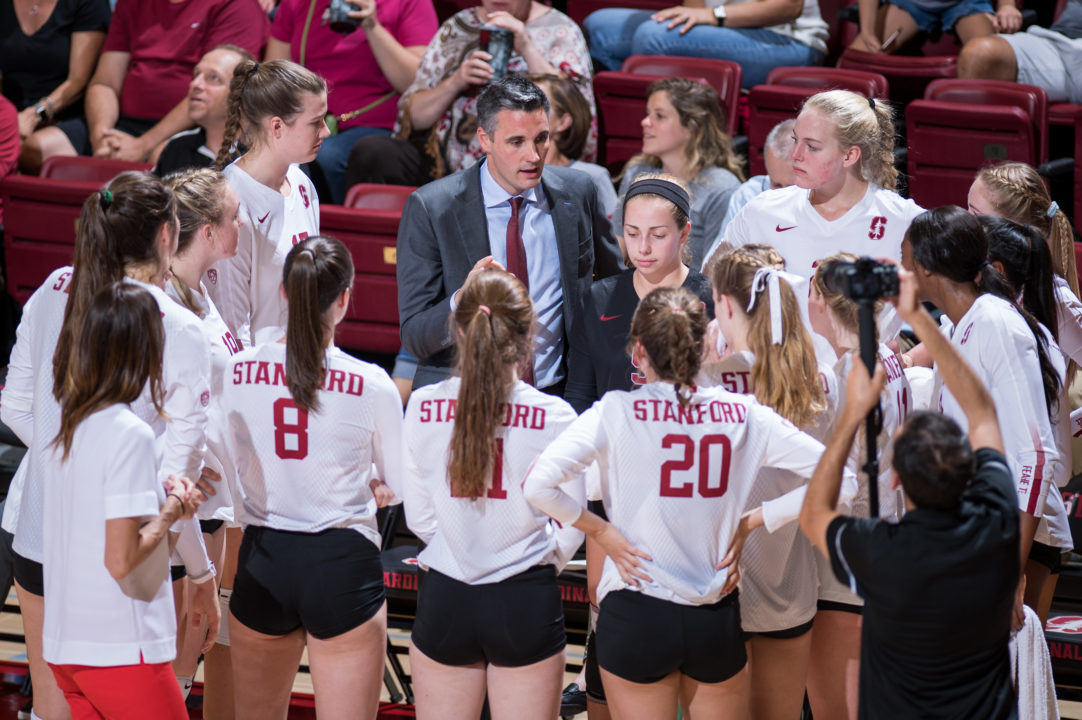
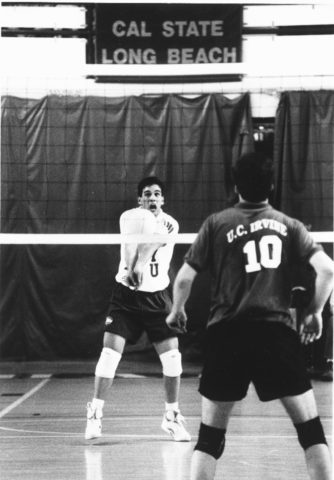
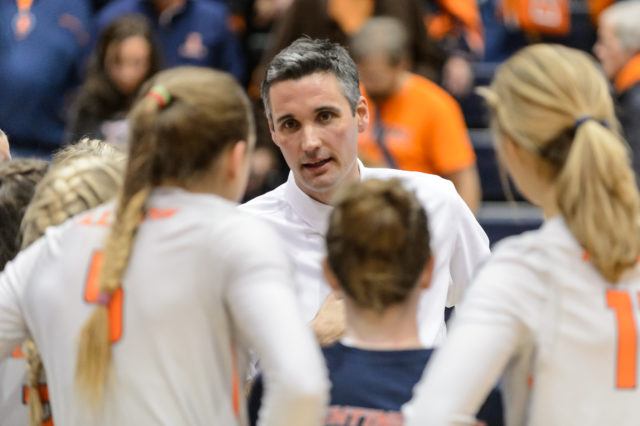
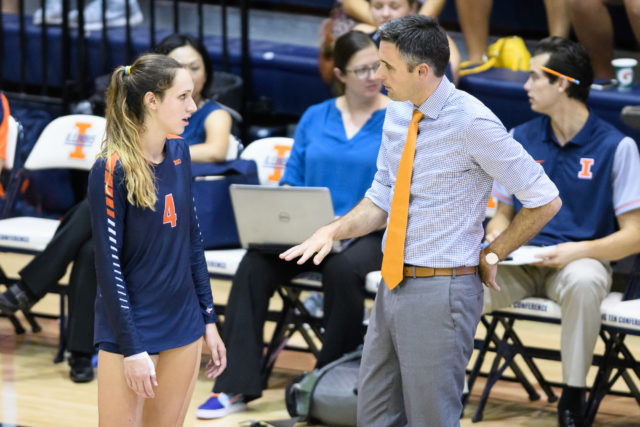
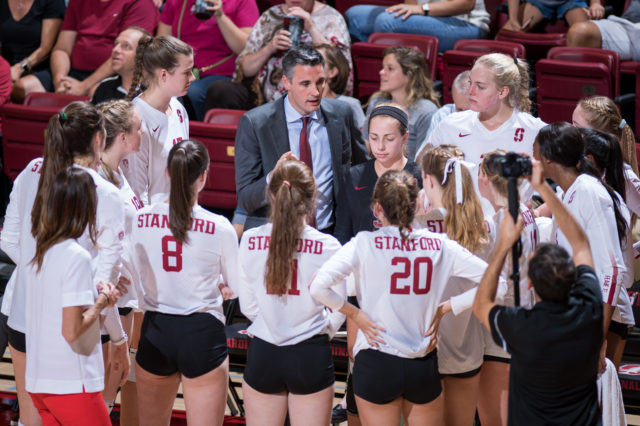
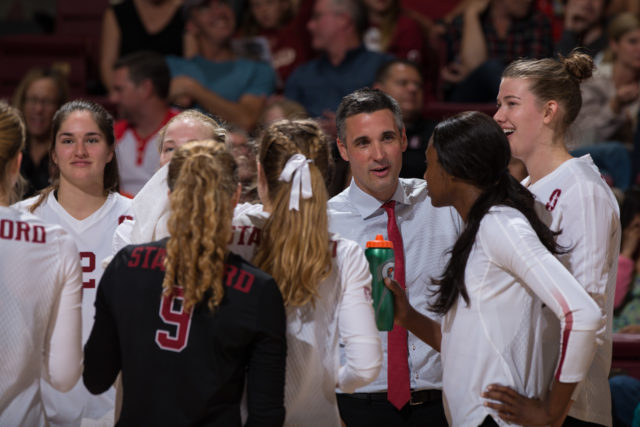
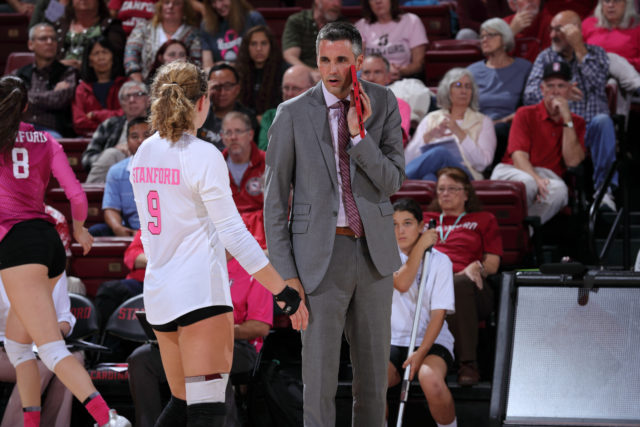
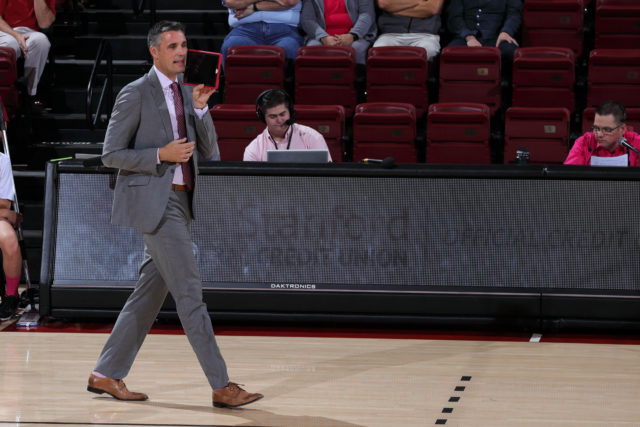
Jenny Gray is also a fantastic setter and is the quarterback of the team.